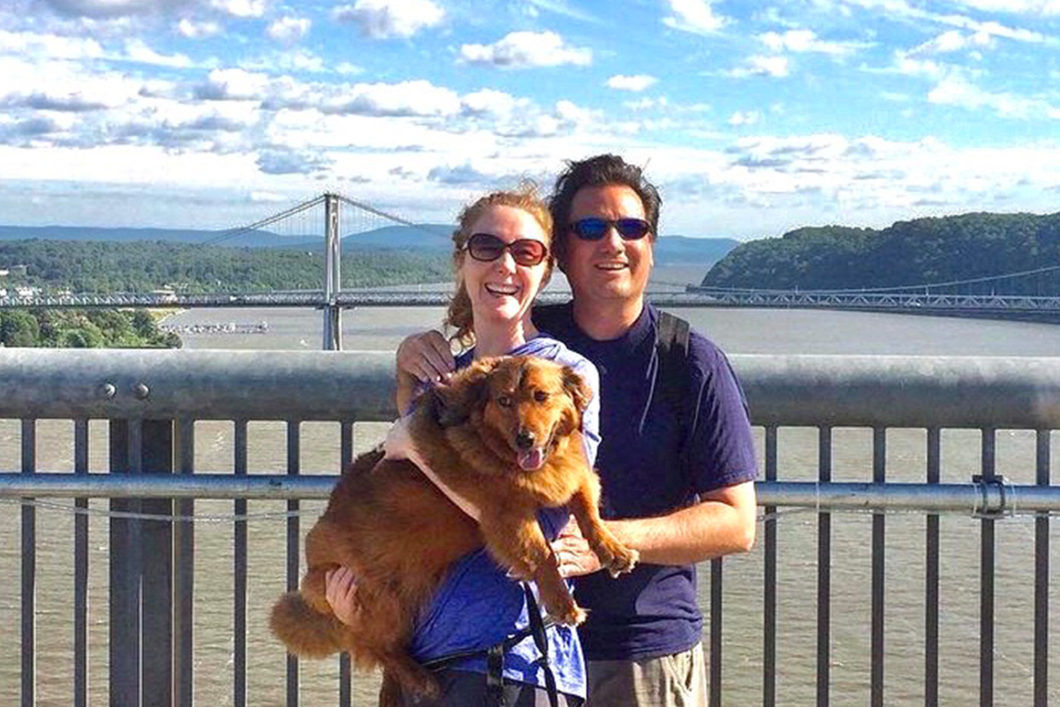After nearly two decades as an early intervention child development specialist and former school social worker, Lynn Coyle-Handy’s changing careers and going back to college to become a school SLP—where she can shift her focus onto helping children with communication challenges; specifically, children with autism spectrum disorder (ASD).
Quick Facts About Lynn
- Master’s in psychology from LaSalle University
- New Jersey-certified school social worker
- Current post-baccalaureate CSD student at SUNY New Paltz
- National NSSLHA member for 1 year
- Practices aerial yoga and loves to hike with her husband, Peter, and dog, Rio
What Inspired You to Change Careers and Return to School After Nearly Two Decades?
During my career, I worked with many children who had communication challenges and saw firsthand the frustration and isolation children feel when they’re misunderstood. I also witnessed the joyful transformation when they learned how to express their needs, wants, and feelings. Their faces lit up when their families and teachers heard and responded to them, which cultivated more confidence and closer relationships with loved ones.
“Everyone deserves a voice. Thank you for helping Ruby find hers.” This heartfelt “thank you” from one of my EI families planted the seed to return to school to learn more about communication disorders and start my path toward becoming an SLP.
How Will Your Experience Help You as an SLP?
Pragmatics is a big challenge for children with ASD. As a school social worker, I conducted many social skills groups to enhance students’ practical everyday conversations. For children who needed guidance on how to treat others the way they would like to be treated, we used the acronym, THINK. I asked, “Before you speak . . .
- Is it True?
- Is it Helpful?
- Is it Important?
- Is it Necessary?
- Is it Kind?”
We worked on understanding how others may not want to know all of the facts the student knows on a topic, and that others deserve a turn to share their interests in a conversation. Believe it or not, not everyone wants to talk about dinosaurs all of the time!
I also believe it’s important to take a holistic approach when working on communication and to work within the child’s family system. Children primarily learn language from their family members and caregivers. They have a profound effect on their children’s lives when they incorporate the communication strategies I model during therapy sessions into their family routines.
Who Inspires You as a #SLP2B?
Megan Richardson (one of my SUNY New Paltz CSD professors) inspires me with her bravery, as she continues conducting speech-language pathology services in-person, on the front lines, in full PPE during the COVID-19 pandemic.
Dr. Kia Johnson, Dr. Lakeisha Johnson, and Dr. Kyomi Gregory are SLPs and researchers who inspire me through their lectures, webinars, and articles about best practices when working with culturally and linguistically diverse children. I particularly love Dr. Lakeisha Johnson’s website, Maya’s Book Nook, which promotes language and literacy through diverse children’s literature. Children can learn so much through reading others’ narratives. When reading stories with my ASD students, using diverse children’s literature provides a key to new worlds and cultures, simultaneously building empathy and opening up conversation about how we all contribute unique perspectives to the world.
I’ve also been inspired by Dr. Michelle Hu’s journey as an audiologist and patient with bilateral cochlear implants. Several of the children I worked with in the past had chronic otitis media; many had ear tubes to drain and prevent buildup of fluid in the middle ear, while others required hearing aids. I saw first-hand the positive differences in their speech after their procedures. Dr. Hu shares her perspective of both an individual with hearing loss, as well as an audiologist.
How Can Non-Traditional Students Connect with Others in CSD?
Be yourself, reach out, and pay it forward. Attend National NSSLHA, ASHA, and other CSD-related webinars and conferences whenever possible—particularly on topics like diversity, equity, and inclusion (DEI); the graduate school process; and future career options as audiologists and SLPs. Share resources and networking opportunities with those in your cohort. Connect with students, NSSLHA members, faculty, and professionals online.
Through my National NSSLHA membership, I’ve built a sense of community with many students and practitioners who share similar interests. I connect with others by sharing resources and asking for guidance on the NSSLHA/ASHA Community threads, Instagram, and LinkedIn. I also joined ASHA’s SIG 16: School-based Issues at a discounted rate with my National NSSLHA membership, which has given me opportunities to participate in vibrant discussions about school SLP and early intervention tools, evaluations, strategies, and online conferences.
National NSSLHA is a collaborative community of students who support each other while we work toward similar goals. I encourage you to get involved!


Lynn Coyle-Handy is a true gem! Inside and outside the office. Her dedication to her students, their families and her friends is inspirational.